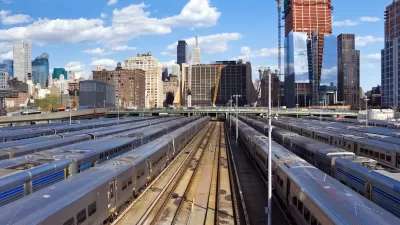Funding from a nonprofit initiative provides concrete measures to prevent displacement due to the construction of the Green Line in the Twin Cities.
Major infrastructure projects such as railway constructions often result in displacement of adjacent homes as well as negative impacts to surrounding businesses. As Jessica Leber reports, in building the Green Line light rail line to connect Minneapolis and St. Paul, everyone from the "government, nonprofits, businesses, and the local community" convened from the planning stage to avoid such outcomes.
Aptly named the Corridor of Opportunities project, the Twin Cities' collaborative effort was possible due to support from the nonprofit organization Living Cities and its Integration Initiative. Leber describes the goals of the initiative: "For the last three years, the initiative has provided a total of $85 million in grants, low-interest loans, and market-rate loans…To get everyone who has a stake in the city’s future working together to tackle a specific problem."
The Integration Initiative grants in conjunction with funding from the U.S. Department of Housing and Urban Development allowed the Corridor of Opportunities team to approach the transit-oriented project with the interest of the communities in mind: "[The team] created city staff jobs devoted to transit-oriented development and passed laws that changed the system, such as assigning greater weight to affordable housing projects located near transit" as well as "financing seven mixed-income and affordable housing development [sic]…about two dozen smaller projects and market research studies that would not only bolster the communities disrupted by construction and [sic] but also protect them from inevitably rising land values in the future." Other efforts included "fund[ing] facade and infrastructure improvements to help businesses improve their own look."
Leber notes the project's successful outcome: "Of 350 businesses that received assistance during the period of heavy construction, only four folded." Nine other cities are currently working with the Livable Cities' Integration Initiative.
FULL STORY: Linking Minneapolis And St. Paul With A Transit Project That Doesn't Destroy Communities

Planetizen Federal Action Tracker
A weekly monitor of how Trump’s orders and actions are impacting planners and planning in America.

Maui's Vacation Rental Debate Turns Ugly
Verbal attacks, misinformation campaigns and fistfights plague a high-stakes debate to convert thousands of vacation rentals into long-term housing.

San Francisco Suspends Traffic Calming Amidst Record Deaths
Citing “a challenging fiscal landscape,” the city will cease the program on the heels of 42 traffic deaths, including 24 pedestrians.

Defunct Pittsburgh Power Plant to Become Residential Tower
A decommissioned steam heat plant will be redeveloped into almost 100 affordable housing units.

Trump Prompts Restructuring of Transportation Research Board in “Unprecedented Overreach”
The TRB has eliminated more than half of its committees including those focused on climate, equity, and cities.

Amtrak Rolls Out New Orleans to Alabama “Mardi Gras” Train
The new service will operate morning and evening departures between Mobile and New Orleans.
Urban Design for Planners 1: Software Tools
This six-course series explores essential urban design concepts using open source software and equips planners with the tools they need to participate fully in the urban design process.
Planning for Universal Design
Learn the tools for implementing Universal Design in planning regulations.
Heyer Gruel & Associates PA
JM Goldson LLC
Custer County Colorado
City of Camden Redevelopment Agency
City of Astoria
Transportation Research & Education Center (TREC) at Portland State University
Jefferson Parish Government
Camden Redevelopment Agency
City of Claremont





























